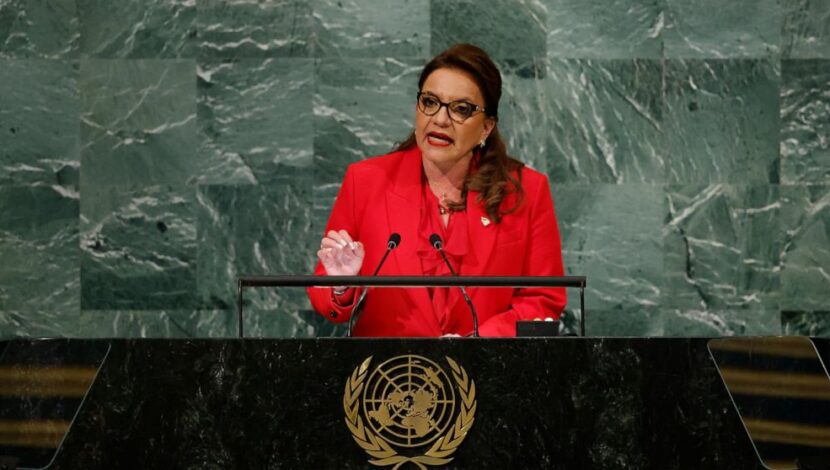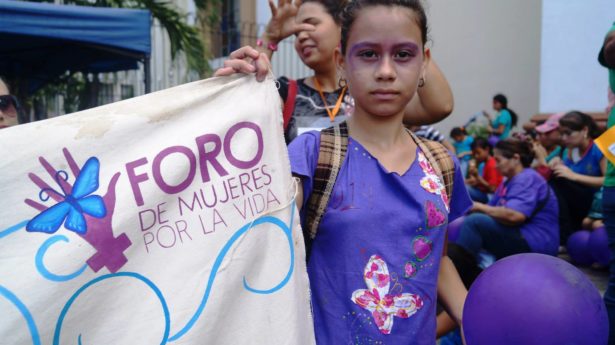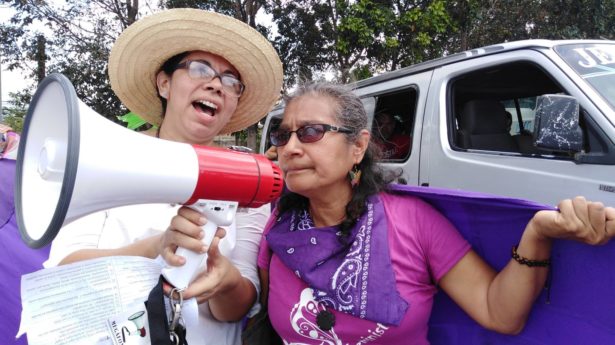The Unitarian Universalist Service Committee advances human rights through grassroots collaborations.
Xiomara Castro’s First Year

By UUSC Staff on December 6, 2022
In late November of 2021, Xiomara Castro won election as the first female president of Honduras, ending 12 years of rule by the right-wing National Party and ushering in hope for change in a country beset by patriarchal violence, corruption, and poverty.
After her historic victory, UUSC identified three areas in which Castro’s reforms could especially benefit the people of Honduras: addressing gender-based violence, restoring and strengthening democratic norms, and promoting social and economic justice. On the campaign trail, President Castro promised to take action on all three of these issues. Now that a full year has passed in office, we check in on the progress her administration has made and the challenges that lie ahead.
Gender-Based Violence
Honduran women, LGBTQ+, and gender-nonconforming people face severe levels of violence. Moreover, when they try to report and seek redress for these crimes, they confront barriers to justice at every level of government and society. UUSC’s partners, Foro de Mujeres Por la Vida, have documented for years—through their Women’s Security Observatory—both high rates of femicide (murders of women because they are women) and systematic impunity in the Honduran justice system for perpetrators of these crimes.
These forms of violence are compounded at the institutional level by policies that deny women access to reproductive rights and health care. Unlike many countries in Latin America, Honduras criminalizes abortion without exception and also places severe limitations on women’s access to emergency contraception.
President Castro came into office promising to reverse the tide of this patriarchal repression, but progress has been limited. UUSC’s Honduran partners still report pervasive violence against women. And Castro’s pledge to expand reproductive justice in Honduras has met with opposition from conservative factions within her own governing coalition. Early last month, Castro’s health minister announced that emergency contraception would soon become available in cases of rape, but this small—if significant—concession falls far short of full protection for reproductive health care in Honduras.
Meanwhile, Castro’s government has continued to use military police units in Honduras that have been linked to grave human rights violations, quashing the hopes of many civil society advocates that her government would reverse the militarization of Honduran society. The use of military police has been justified as a strategy to stop gang violence, but as our partners at Foro de Mujeres have long argued, militarism is a major cause of violence against women in Honduras; it cannot be a part of the solution to the insecurity many women and other Honduran civilians face in daily life.
Democratic Governance
Castro’s election restored hope for Honduran democratic norms after more than a decade of authoritarian rule. The previous governing party came to power through a coup against the democratically-elected president, Manuel Zelaya (who is Castro’s husband), and while the right-wing National Party subsequently held elections, they were repeatedly marred by corruption and fraud. Honduras’ previous right-wing president, Juan Orlando Hernanez, not only oversaw a further deterioration in Honduras’ democratic governance, he was also directly implicated in high-level drug trafficking.
When Castro was elected with a clear popular mandate, she pledged to root out corruption and restore democratic governance in Honduras. Since then, she has taken several significant steps to make good on these commitments, including by repealing the country’s widely-criticized “secrets law” and resuming talks with the United Nations to establish an anti-corruption mechanism for the country. Perhaps most dramatically, her government also oversaw the extradition of the country’s former corrupt leader, Juan Orlando Hernandez, to face trial in the United States for his alleged role in a conspiracy to smuggle cocaine.
Despite these positive steps, however, there are also worrying signs of authoritarian backsliding. Within days of the one-year mark since Castro’s election, her government invoked emergency powers under a “state of exception” and mobilized hundreds of military police officers in a bid to crack down on organized crime. While the invocation of these powers does not immediately suspend Honduran citizens’ constitutional rights, due to the need for legislative authorization for such a step, these restrictions on civil liberties are part of the plan Castro announced for combatting gang-related extortion.
Extortion and gang-related violence are serious problems in Honduras and a major cause of forced migration abroad—but suspending constitutional rights and expanding the use of military police are not the answer. In recent years, the militarization of Honduran police and the expansion of government powers have only worsened corruption and insecurity for ordinary Hondurans. By doubling down on these policies, Castro risks perpetuating the mistakes of her predecessors and mimicking the harsh “mano dura” policies that have fueled repression and authoritarianism in some of Honduras’ neighbors.
Economic Justice
Last year, we also wrote about how Castro’s election offered hope of addressing unjust economic practices that were depriving Indigenous and Afro-Honduran people of their land rights. In particular, we welcomed her campaign pledge to oppose the so-called “special economic development zones” (or ZEDEs) in Honduras, which contribute to the poor working conditions, low wages, corruption, and violence that have forced many Honduran people to flee their homes.
These quasi-autonomous charter cities are set up to allow private corporations to evade Honduran and international labor protections and other regulatory safeguards. Though neoliberal economists and politicians in the United States have championed the ZEDEs as a cure-all for Honduras’ economic ills—and even misleadingly presented them as a solution for the problem of forced migration in Honduras—in reality they are linked to corruption, violence, and the dispossession and disappearance of Indigenous and Afro-Honduran activists. They are therefore a cause of, not a solution to, Hondurans’ inability to stay safely at home. Castro’s pledge to limit their extent thus promised to strike a blow for land rights and economic justice for many ordinary Hondurans.
After a year in office, however, Castro’s efforts to halt the ZEDEs have faced major headwinds from powerful interests, including parts of the U.S. government. When she appeared to win a major policy victory in April, for instance, when the Honduran congress voted unanimously to abolish the law authorizing ZEDEs, two U.S. senators responded by pressuring the State Department to take action against her government. The senators’ letter cited research in support of the ZEDEs from a think tank that has reportedly received funding from companies invested in the special economic zones.
Meanwhile, activists report that despite the legislative victory, the ZEDEs continue to operate and expand on the ground. In these zones and elsewhere in the country, private actors still threaten the lives and safety of people defending land rights, as UUSC and other organizations have documented. For all President Castro’s promises of change, therefore, her administration has not eliminated the dangers that Honduran human rights defenders face throughout the country.
As we noted at this time a year ago, no one government or elected official can fully protect human rights, and every government—no matter who helms it—must be held accountable to the same high standard of promoting human rights. After a year in office, Castro has not fully addressed the multiple challenges that Honduran people face, and structural barriers remain to her ability to make change. This is why we continue to advocate for further progress in Honduras, while also working to change our own government’s policies toward the country, and to follow the leadership of the grassroots Honduran organizations who will insist on defending their rights under this as well as every other administration.
Image Credit: ABC News

